Module1
- 格式:doc
- 大小:58.00 KB
- 文档页数:4
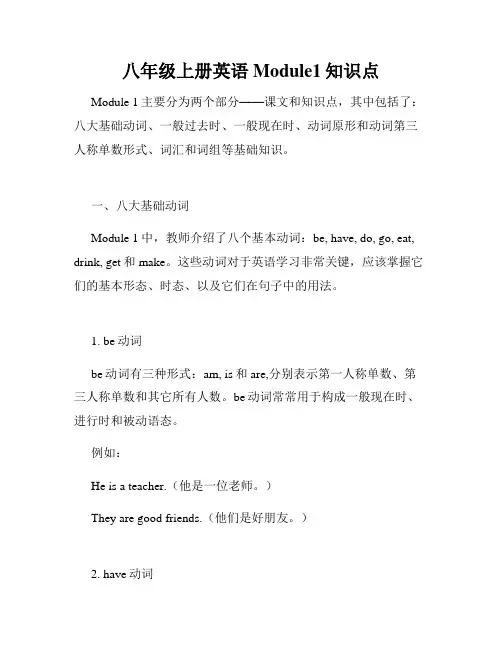
八年级上册英语Module1知识点Module 1主要分为两个部分——课文和知识点,其中包括了:八大基础动词、一般过去时、一般现在时、动词原形和动词第三人称单数形式、词汇和词组等基础知识。
一、八大基础动词Module 1中,教师介绍了八个基本动词:be, have, do, go, eat, drink, get和make。
这些动词对于英语学习非常关键,应该掌握它们的基本形态、时态、以及它们在句子中的用法。
1. be动词be动词有三种形式:am, is和are,分别表示第一人称单数、第三人称单数和其它所有人数。
be动词常常用于构成一般现在时、进行时和被动语态。
例如:He is a teacher.(他是一位老师。
)They are good friends.(他们是好朋友。
)2. have动词have动词有两种形式:have和has,分别表示第一人称单数、第三人称单数和其它所有人数。
have动词通常用于构成现在完成时和短语动词。
例如:He has finished his homework.(他已经完成了他的作业。
)I have to work hard.(我必须努力工作。
)3. do动词do动词有两种形式:do和does,分别表示第一人称单数、第三人称单数和其它所有人数。
do动词通常用于构成一般现在时和疑问句。
例如:Do you like Chinese food?(你喜欢中国食品吗?)He does his homework every day.(他每天做作业。
)4. go动词go动词只有一种形式,表示所有的人称和时态。
go动词常用于构成一般现在时、进行时和短语动词。
例如:I often go to the park on weekends.(我经常在周末去公园。
)She is going to the store now.(她现在正去商店。
)5. eat动词eat动词只有一种形式,表示所有的人称和时态。
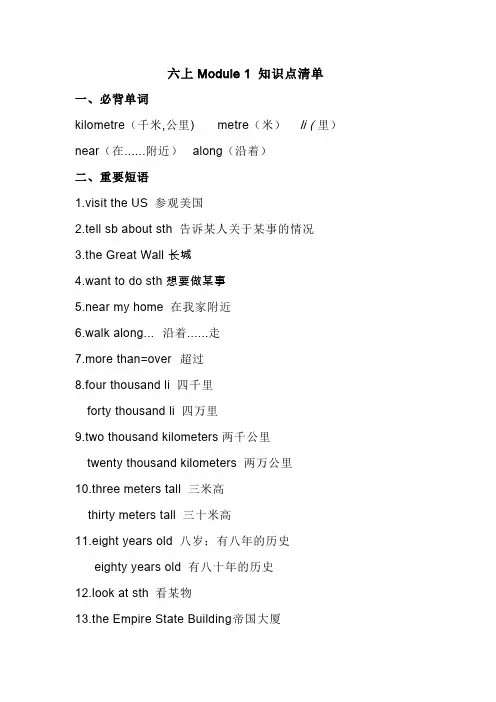
六上Module 1 知识点清单一、必背单词kilometre(千米,公里) metre(米)li(里)near(在......附近) along(沿着)二、重要短语1.visit the US 参观美国2.tell sb about sth 告诉某人关于某事的情况3.the Great Wall 长城4.want to do sth 想要做某事5.near my home 在我家附近6.walk along... 沿着......走7.more than=over 超过8.four thousand li 四千里forty thousand li 四万里9.two thousand kilometers两千公里twenty thousand kilometers 两万公里10.three meters tall 三米高thirty meters tall 三十米高11.eight years old 八岁;有八年的历史eighty years old 有八十年的历史12.look at sth 看某物13.the Empire State Building 帝国大厦14.an office building 办公大楼15.climb the stairs 爬楼梯三、口语表达1. All right. 好的。
2. It’s so high!它真高!3. It’s my secret.它是我的秘密。
四、重点句型1.提问某物的长度的句子:How long is + 其他?eg:-How long is the Great Wall? 长城有多长?-It’s more than forty thousand li long. 它长达四万多里。
2.提问某物有多少年历史的句子:How old is + 其他?eg:-How old is the bridge? 这座桥有多少年的历史?-It’s more than four hundred years old. 它有四百多年的历史。
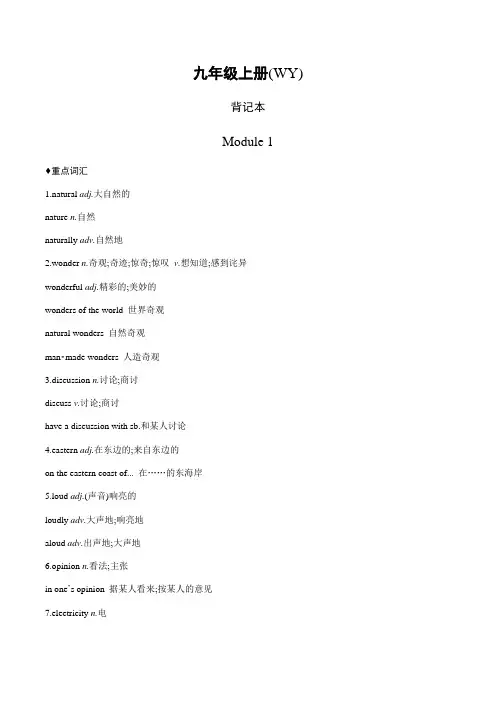
九年级上册(WY)背记本Module 1♦重点词汇1.natural adj.大自然的nature n.自然naturally adv.自然地2.wonder n.奇观;奇迹;惊奇;惊叹v.想知道;感到诧异wonderful adj.精彩的;美妙的wonders of the world 世界奇观natural wonders 自然奇观man⁃made wonders 人造奇观3.discussion n.讨论;商讨discuss v.讨论;商讨have a discussion with sb.和某人讨论4.eastern adj.在东边的;来自东边的on the eastern coast of... 在……的东海岸5.loud adj.(声音)响亮的loudly adv.大声地;响亮地aloud adv.出声地;大声地6.opinion n.看法;主张in one’s opinion 据某人看来;按某人的意见7.electricity n.电electric adj.电的;用电的electrical adj.用电的;电动的electronic adj.电子的;电子设备的produce electricity 发电supply electricity 供电electric light/guitar 电灯/电吉他electrical equipment/wiring 电气设备/供电线路8.shine(shone/shined,shone/shined) v.照耀9.silent adj.寂静的silently adv.沉默地;无声地silence n.寂静;无声remain/stay/keep silent 保持沉默10.reply v.回答;答复reply to a question 回答问题11.clear v.(烟雾等)开始消失adj.清楚的;明白的;晴朗的clearly adv.清楚地;明白地12.join in参加;加入(活动)take part in 参加13.agree with sb.同意某人的看法sb.agree with sth.某人适应(食物、气候等)agree to do sth.同意做某事agree to sth.同意/赞成(计划/决定/建议等)agree on sth.在……方面意见一致14.more than=over 多于,超过lions of 数百万的;数以百万计的thousands of 成千上万的16.would like to do sth.=want to do sth.想做某事would like sb.to do sth.想要某人做某事17.be interested in 对……感兴趣18.to some degree 在某种程度上19.get out of...从……出来20.go through (从物体内部)穿过;从头至尾的练习21.fall away突然向下倾斜fall down/over跌倒;摔倒fall off跌落;掉落22.look over 从(某物上面)看过去:仔细检查look across眺望look down to 俯视;向下看look like 看起来像look out 小心;谨慎look after 照顾23.on top of 在……上面;盖住24.at the bottom of在……的底部25.on both sides在两边26.be famous for=be well⁃known for以……而闻名be famous as=be well⁃known as作为……而出名27.do an interview (with sb.)采访(某人)28.go down下去;下沉;坠落29.wait for等候30.in height高度;身高31.at the end of 在……的末尾32.be afraid of 害怕……♦重点句型1.Let’s call Wonders of the World and join in the discussion.我们给《世界奇观》节目打电话,加入讨论吧。
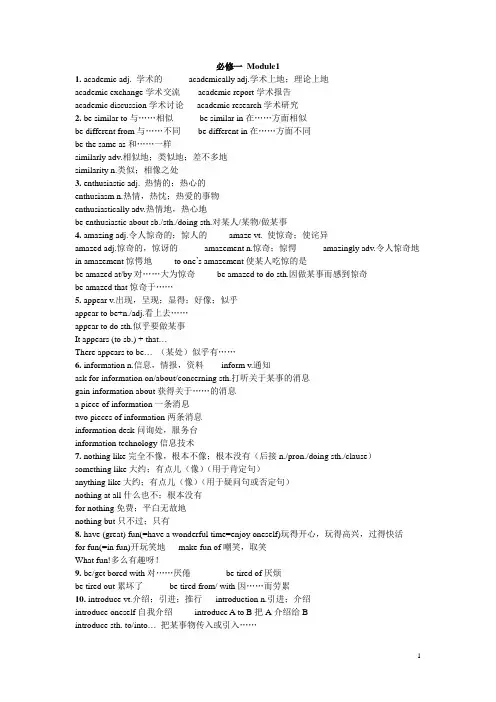
必修一Module11. academic adj. 学术的academically adj.学术上地;理论上地academic exchange学术交流academic report学术报告academic discussion学术讨论academic research学术研究2. be similar to与……相似be similar in在……方面相似be different from与……不同be different in在……方面不同be the same as和……一样similarly adv.相似地;类似地;差不多地similarity n.类似;相像之处3. enthusiastic adj. 热情的;热心的enthusiasm n.热情,热忱;热爱的事物enthusiastically adv.热情地,热心地be enthusiastic about sb./sth./doing sth.对某人/某物/做某事4. amazing adj.令人惊奇的;惊人的amaze vt. 使惊奇;使诧异amazed adj.惊奇的,惊讶的amazement n.惊奇;惊愕amazingly adv.令人惊奇地in amazement惊愕地to one’s amazement使某人吃惊的是be amazed at/by对……大为惊奇be amazed to do sth.因做某事而感到惊奇be amazed that惊奇于……5. appear v.出现,呈现;显得;好像;似乎appear to be+n./adj.看上去……appear to do sth.似乎要做某事It appears (to sb.) + that…There appears to be…(某处)似乎有……6. information n.信息,情报,资料inform v.通知ask for information on/about/concerning sth.打听关于某事的消息gain information about获得关于……的消息a piece of information一条消息two pieces of information两条消息information desk问询处,服务台information technology信息技术7. nothing like完全不像,根本不像;根本没有(后接n./pron./doing sth./clause)something like大约;有点儿(像)(用于肯定句)anything like大约;有点儿(像)(用于疑问句或否定句)nothing at all什么也不;根本没有for nothing免费;平白无故地nothing but只不过;只有8. have (great) fun(=have a wonderful time=enjoy oneself)玩得开心,玩得高兴,过得快活for fun(=in fun)开玩笑地make fun of嘲笑,取笑What fun!多么有趣呀!9. be/get bored with对……厌倦be tired of厌烦be tired out累坏了be tired from/ with因……而劳累10. introduce vt.介绍;引进;推行introduction n.引进;介绍introduce oneself自我介绍introduce A to B把A介绍给Bintroduce sth. to/into…把某事物传入或引入……11. embarrass vt.使窘迫,使尴尬;使困惑embarrassing adj.令人害羞的/难堪的/惭愧的embarrassment n.害羞;窘迫;愧疚;难堪;困境embarrassed adj.窘迫的;尴尬的;害羞的be embarrassed about/at因……而窘迫/害羞/尴尬be embarrassed to do sth.窘迫/害羞/尴尬地做某事12. instruct v.教授,传授;指示,指导;通知,告知instruction n.命令,指示;教导;指导follow one’s instructions按照某人的指示做under sb.’s instructions在某人的指导下give instructions in…给予……(方面的)指导13. in words用言语in a word总之,简言之break one’s word食言,不遵守诺言by word of mouth口头上,经口述keep one’s word遵守诺言leave word留言word for word逐字地send word捎信big words大话get a wordin/get in a word插话have words with sb.与某人吵架have a word with与……谈一下,与……说句话插入语汇总:in other words(=that is to say)换句话说,也就是说,换言之(作插入语)believe it or not信不信由你in fact事实上,实际上to be brief简而言之to be honest说实话,老实说to be frank坦率地讲by the way顺便说一下that is to say即,也就是说to be exact确切地讲what’s more更重要的是for example例如14. 倍数表达法:(1) A is…倍数+as+形容词原级+as+Be.g. The new stadium being built for the next Asian Games will be three times as big as the present one.(2)A is…倍数+形容词比较级+than+Be.g. Their garden is three times bigger than ours.(3)A is…倍数+the+性质名词(size,length)+of+Be.g. Their garden is three times the size of ours(4)The + 性质名词(size,length…)+of + A+be+倍数+that+of+Be.g. The size of their garden is three times that of ours.15. They say that…“据说……”=It is said that…=主语+be said + to do sth.It is hoped that…人们希望……It is required that…有人要求……It is believed that…人们相信It is supposed that…据推测……It is reported that…据报道……It is thought that…人们认为……It is considered that…人们认为……It is suggested that…有人建议……16. a /the description of sb./sth.某人/某物的说明beyond/past description无法形容的;难以形容的17.“动词+介词to”的短语:look forward to期望,盼望be/get used to习惯于pay a visit to访问stick to坚持object to反对pay attention to注意prefer… to…与……相比更喜欢……refer to参考;涉及;指的是get down to着手,开始lead to导致;通向18. be impressed by/with…对……留下深刻的(好)印象impress sb. with sth.某事物给某人留下深刻的(好)印象impress… on/upon sb.使某人意识到(重要性或严重性等)19. encourage vt.支持。
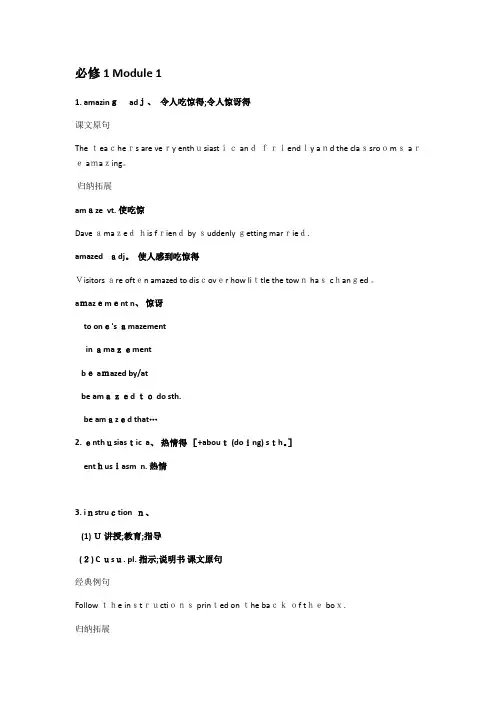
必修1 Module 11. amazingadj、令人吃惊得;令人惊讶得课文原句The teachers are very enthusiastic andfriendly and the classrooms are amazing。
归纳拓展amaze vt. 使吃惊Dave amazedhis friend by suddenly getting married.amazed adj。
使人感到吃惊得Visitors are often amazed to discover how little the town has changed 。
amazement n、惊讶to one's amazementin amazementbe amazed by/atbe amazed to do sth.be amazed that…2. enthusiastic a、热情得[+about (doing) sth。
]enthusiasm n. 热情3. instruction n、(1) U讲授;教育;指导(2) C usu. pl. 指示;说明书课文原句经典例句Follow the instructions printed on the backof the box.归纳拓展(1)follow instructions 服从指示under one’s instruction在某人得指导下(2)instruct vt。
指导;教导;命令instruct sb。
to do sth、instruct sb. in sth、教授某人某方面得内容例句:You will receive basic instructions in navigation、4、 attitude n、态度;瞧法;姿态课文原句Describe your attitude to studying English、经典例句He has a bad attitude towards his schoolwork、As soon as they found out I was a doctor their whole attitude changed、归纳拓展attitude to/toward(s) sb、/sth. 对…得瞧法/态度have a positive/negative attitude to/ towardssb、/ sth。
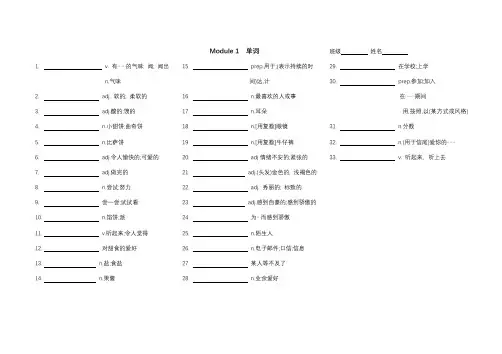
1.v. 有……的气味; 闻; 闻
出
n.气味
2.adj. 软的; 柔软的
3.adj.酸的;馊的
4.n.小甜饼;曲奇饼
5.n.比萨饼
6.adj.令人愉快的;可爱的
7.adj.做完的
8.n.尝试;努力
9.尝一尝;试试看
10.n.馅饼;派
11.v.听起来;令人觉得
12.对甜食的爱好
13.n.盐;食盐
14.n.果酱
Module 1 单词
15. prep.用于;(表示持续的时
间)达,计
16. n.最喜欢的人或事
17. n.耳朵
18. n.[用复数]眼镜
19. n.[用复数]牛仔裤
20. adj情绪不安的;紧张的
21. adj.(头发)金色的, 浅褐色的
22. adj. 秀丽的; 标致的
23. adj.感到自豪的;感到骄傲的
24. 为…而感到骄傲
25. n.陌生人
26. n.电子邮件;口信;信息
27. 某人等不及了
28. n.业余爱好
班级姓名
29. 在学校;上学
30. prep.参加;加入
在……·期间
用,按照,以(某方式或风
格)
31. n.分数
32. n.(用于信尾)爱你的……
33. v. 听起来,听上去。
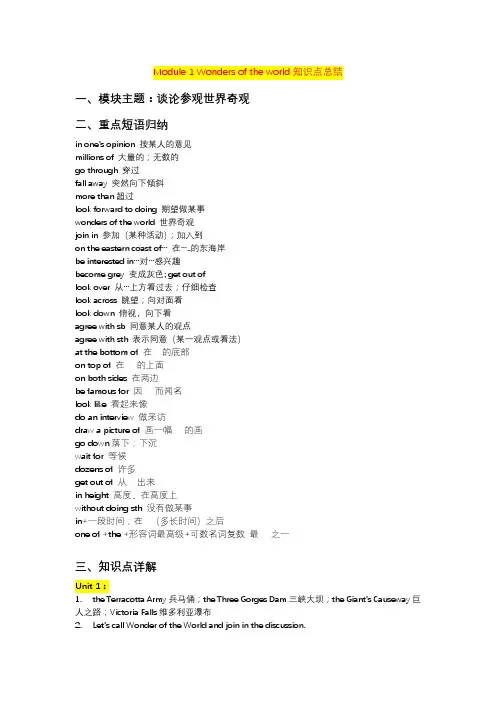
Module 1 Wonders of the world知识点总结一、模块主题:谈论参观世界奇观二、重点短语归纳in one’s opinion 按某人的意见millions of 大量的;无数的go through 穿过fall away 突然向下倾斜more than超过look forward to doing 期望做某事wonders of the world 世界奇观join in 参加(某种活动);加入到on the eastern coast of… 在…..的东海岸be interested in…对…感兴趣become grey 变成灰色; get out oflook over 从…上方看过去;仔细检查look across 眺望;向对面看look down 俯视,向下看agree with sb 同意某人的观点agree with sth 表示同意(某一观点或看法)at the bottom of 在…..的底部on top of 在……的上面on both sides 在两边be famous for 因……而闻名look like 看起来像do an interview 做采访draw a picture of 画一幅……的画go down落下;下沉wait for 等候dozens of 许多get out of 从…..出来in height 高度,在高度上without doing sth 没有做某事in+一段时间;在….(多长时间)之后one of +the +形容词最高级+可数名词复数最……之一三、知识点详解Unit 1:1. the Terracotta Army兵马俑;the Three Gorges Dam三峡大坝;the Giant’s Causeway巨人之路;Victoria Falls维多利亚瀑布2. Let’s call Wonder of the World and join in the discussion.(1) let的用法:让:let sb. (not) do sth. 出租:Room to let, laundry found. 房间出租, 洗衣不另收费.(2) wonder v.“想知道;对…感到好奇”。
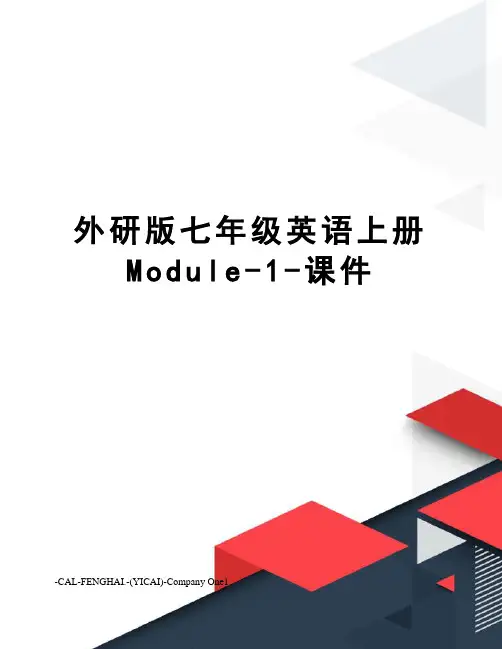
外研版七年级英语上册M o d u l e-1-课件-CAL-FENGHAI.-(YICAI)-Company One1Module 1 My teachher and my friends Unit 1 Good morning ,Miss ZhouUnit 2 Good morning , I’m Chen Zhong. Unit 3 This is my friend .Module 2 My English lesson .Unit 1 Open your bookUnit 2 What’s your numberUnit 3 I’m twelve .Module 3 My English book .Unit 1 What’s this in EnglishUnit 2 Can you help me ,please Unit 3 What colour is itModule 4 My everyday life .Unit 1 What day is it todayUnit 2 What’s the weather likeUnit 3 What’s your favourite sportModule 1 My classmatesUnit 1 Nice to meet you 。
Unit 2 I’m Wang Lingling and I’m thirteen years old . Unit 3 Language in use .Module 2 My family .Unit 1 Is this your mumUnit 2 These are my parents .Unit 3 Language in use .Module 3 My school .Unit 1 There are thirty students in my class .Unit 2 The library is on the left of the playground. Unit 3 Language in use .Module 4 Healthy food .Unit 1 We’ve got lots of apples .Unit 2 Is your food and drink healthyUnit 3 Language in use .Module 5 My school day .Unit 1 I love history .Unit 2 We start work at nine o’clock .Unit 3 Language in use .Module 6 A trip to the zoo .Unit 1 Does it eat meatUnit 2 The tiger lives in Asia .Unit 3 Language in use .2012年7月第一次印刷外研社版新标准初中英语课本初中一年级上册Module 1 My teacher and my friendsUnit 1 Good morning, Miss ZhouUnit 2 Good morning. I'm Chen Zhong.Unit 3 This is my friend.Module 1 Words and expressionsModule 2 My English lessonUnit 1 Open your bookUnit 2 What's your number?Unit 3 I'm twelveModule 2 Words and expressionsModule 3 My English bookUnit 1 What's this in English?Unit 2 Can you help me, please?Unit 3 What colour is it?Module 3 Words and expressionsModule 4 My everyday lifeUnit 1 What day is it today?Unit 2 What's the weather like?Unit 3 What's your favourite sport?Module 4 Words and expressions正式课文部分(各模块有二个单元、一个单词mp3文件)Module 1 My classmatesUnit 1 Nice to meet you.Unit 2 I'm Wang Lingling and I'm thirteen years oldModule 1 Words and expressionsModule 2 My familyUnit 1 Is this your mum?Unit 2 These are my parentsModule 2 Words and expressionsModule 3 My schoolUnit 1 There are thirty students in my class.unit 2 The library is on the left of the playground.Module 3 Words and expressionsModule 4 Healthy foodUnit 1 We've got lots of applesUnit 2 Is your food and drink healthy?……Module 5 My school dayUnit 1 I love historyUnit 2 We start work at nine o'clock.……Module 8 Choosing presentsUnit 1 I always like birthday parties.Unit 2 She often goes to concerts……Module 10 Spring FestivalUnit 1 Are you getting ready for Spring Festival?Unit 2 My mother's cleaning our house and sweeping away bad luck.复习模块Revision module ARevision module A Words and expressionsRevision module BRevision module B Words and expressions。
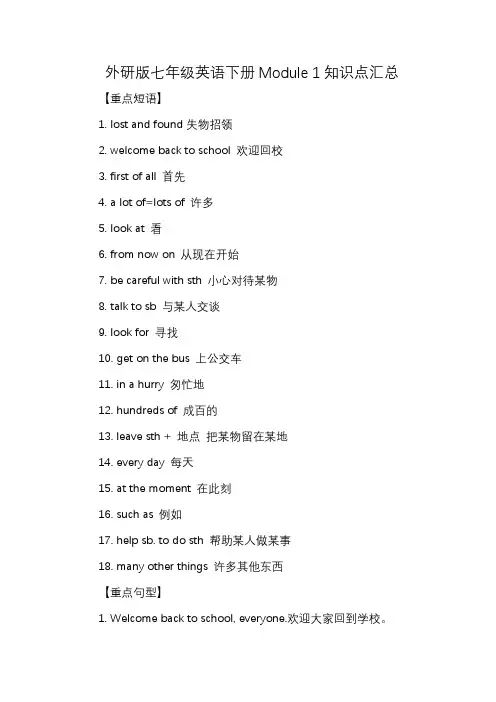
外研版七年级英语下册Module 1知识点汇总【重点短语】1. lost and found 失物招领2. welcome back to school 欢迎回校3. first of all 首先4. a lot of=lots of 许多5. look at 看6. from now on 从现在开始7. be careful with sth 小心对待某物8. talk to sb 与某人交谈9. look for 寻找10. get on the bus 上公交车11. in a hurry 匆忙地12. hundreds of 成百的13. leave sth + 地点把某物留在某地14. every day 每天15. at the moment 在此刻16. such as 例如17. help sb. to do sth 帮助某人做某事18. many other things 许多其他东西【重点句型】1. Welcome back to school, everyone.欢迎大家回到学校。
2. Please be careful with your things from now on.从现在开始请仔细看管你的东西。
3.Whose gloves are they?它们是谁的手套?4. People often lose things when they’re traveling or when they’re in a hurry. They leave things on planes, on trains, on buses and in taxis. 人们旅行或匆忙时经常丢东西。
他们把东西落在飞机上、火车上、公交车上或出租车里。
5. That’s why there are lost and found office at airports and stations. 那就是为何在飞机场和车站设有失物招领处的原因。
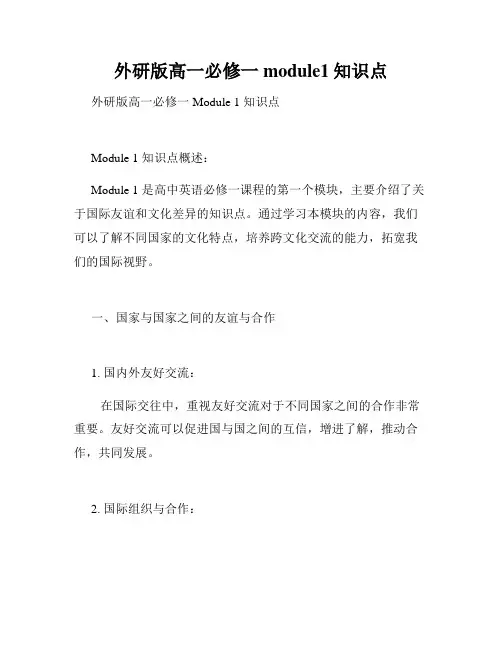
外研版高一必修一module1知识点外研版高一必修一Module 1 知识点Module 1 知识点概述:Module 1 是高中英语必修一课程的第一个模块,主要介绍了关于国际友谊和文化差异的知识点。
通过学习本模块的内容,我们可以了解不同国家的文化特点,培养跨文化交流的能力,拓宽我们的国际视野。
一、国家与国家之间的友谊与合作1. 国内外友好交流:在国际交往中,重视友好交流对于不同国家之间的合作非常重要。
友好交流可以促进国与国之间的互信,增进了解,推动合作,共同发展。
2. 国际组织与合作:国际组织是促进国与国之间友好合作的重要机构。
比如联合国、世界贸易组织等国际组织,它们的目标是维护国际和平与安全,促进各国合作与发展。
二、文化差异与文化交流1. 文化差异的认识:不同国家的文化差异体现在语言、思维方式、宗教信仰、习俗礼仪等方面。
了解文化差异有助于我们更好地进行国际交流与合作。
2. 跨文化交际的重要性:跨文化交际是指跨越语言和文化差异进行有效交流的能力。
跨文化交际能够促进国际友谊,增进彼此理解,有效解决合作中出现的问题。
三、节日与礼仪1. 各国传统节日:不同国家有各种各样的传统节日,比如中国的春节,美国的感恩节,英国的复活节等。
了解各国传统节日有助于增进我们对其他文化的了解。
2. 各国礼仪习俗:礼仪是指特定社会和文化环境下的行为规范。
不同国家的礼仪习俗各有不同,比如中国的鞠躬礼,美国的握手问候等。
了解各国礼仪习俗可以避免文化冲突,增进互相尊重。
四、国际交往技巧1. 跨文化沟通技巧:跨文化沟通需要注意语言表达的准确性和文化敏感度。
避免使用太多的俚语和隐喻,尊重对方的文化习俗和价值观。
2. 解决文化冲突的能力:在国际交往中,不同的文化可能会产生冲突。
解决文化冲突需要双方的宽容和理解,以及寻找双赢的解决方案。
总结:Module 1 的内容主要涉及国际友谊、文化差异和跨文化交际等知识点。
通过学习这些知识点,我们可以更好地理解不同的文化背景,培养国际交往能力,推动国家间的友好合作。
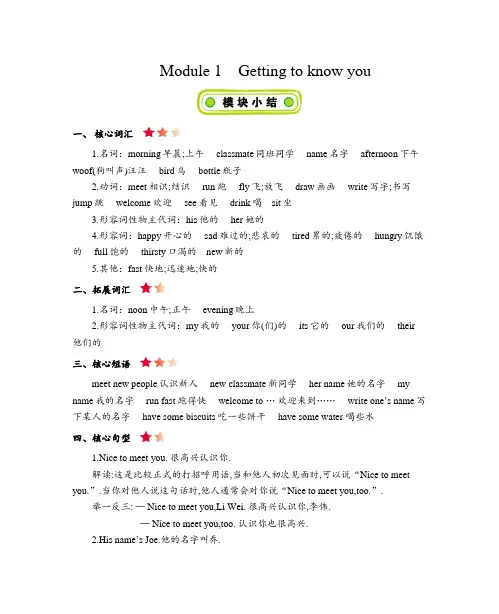
Module 1Getting to know you一、核心词汇1.名词:morning早晨;上午 classmate同班同学 name名字 afternoon下午woof(狗叫声)汪汪 bird鸟 bottle瓶子2.动词:meet相识;结识 run跑 fly飞;放飞 draw画画 write写字;书写jump跳 welcome欢迎 see看见 drink喝sit坐3.形容词性物主代词:his他的 her她的4.形容词:happy开心的 sad难过的;悲哀的 tired累的;疲倦的 hungry饥饿的 full饱的 thirsty口渴的new新的5.其他:fast 快地;迅速地;快的二、拓展词汇1.名词:noon中午;正午 evening晚上2.形容词性物主代词:my我的 your你(们)的 its它的 our我们的 their他们的三、核心短语meet new people认识新人 new classmate新同学 her name她的名字 my name我的名字 run fast跑得快 welcome to …欢迎来到…… write one’s name写下某人的名字 have some biscuits吃一些饼干 have some water 喝些水四、核心句型1.Nice to meet you. 很高兴认识你.解读:这是比较正式的打招呼用语,当和他人初次见面时,可以说“Nice to meet you.”.当你对他人说这句话时,他人通常会对你说“Nice to meet you,too.”.举一反三: — Nice to meet you,Li Wei. 很高兴认识你,李伟.— Nice to meet you,too. 认识你也很高兴.2.His name’s Joe.他的名字叫乔.解读:这是介绍他人姓名的句型.his是形容词性物主代词,后接名词,意为“他的”.Name’s是name is的缩写形式.介绍人还可以用her,介绍物可以用its.自我介绍可以说“My name’s …” .举一反三: Her name is Jenny.她的名字叫詹妮.My name is Li Ming.我的名字叫李明.3.See you. 再见.解读:这是表示“再见”的常用句型.“See you.”是大家常用的临时分别的告别语.举一反三: — See you,Li Ming. 再见,李明.— See you,Mary. 再见,玛丽.4. She can swim. 她会游泳.解读:这是描述“某人会/能做某事”的句型.其中can是情态动词,后接动词原形.举一反三: I can sing and dance. 我会唱歌、跳舞.My mother can play the piano. 我的妈妈会弹钢琴.5. Can you swim? 你会游泳吗?解读:这是can引导的一般疑问句,用来询问“某人是否会/能做某事”.其中can 是情态动词,后接动词原形.举一反三: — Can you answer the question?你能回答这个问题吗?— Yes,I can. 是的,我能./No, I can’t. 不,我不能.6. What can you do? 你会做什么?解读:这是what引导的特殊疑问句,用来询问“某人会/能做什么”.举一反三: — What can you do?你会做什么?— I can fly a kite. 我会放风筝.7. Good evening. 晚上好.解读:这是打招呼的常用语.一般晚上见面都可以用“Good evening.”,回答也用“Good evening.”.举一反三: — Good evening, Daming.晚上好,大明.— Good evening,Jenny. 晚上好,詹妮.8. Here are our friends — Supergirl and Superdog! 这是我们的朋友——女超人和超级狗!解读:这是介绍某人某物的句型,其中句子用了部分倒装形式.举一反三: Here is my mother. 这是我的妈妈.Here comes the bus. 公共汽车来了.9. I’m happy. 我很开心.解读:这是描述人感受的句子.其中am是系动词.和后面的形容词一起表达完整的含义,用以说明主语的状态、性质、特征等.其中am还可换为feel.举一反三: I am very excited. 我非常兴奋.10. Are you happy?你开心吗?解读:这是询问某人是否有某种感受的句子.举一反三: — Is she sad?她伤心吗?— Yes,she is. 是的,她伤心.11. I have a new kite. 我有一个新风筝.解读:这是描述某人拥有某物的句型.其中have意为“有;拥有”,后接名词,表示“有……”.举一反三: I have a blue pencil.我有一支蓝铅笔.We have a new English teacher. 我们有一位新英语老师.12. Look at my bike!看我的自行车!解读:此句是用来吸引某人的注意力、让某人看某物的常用句型.举一反三: Look at my new pen. 看我的新钢笔.Look at him. He is angry. 看他.他很生气.13. How are you?你们好吗?解读:这是熟人之间的问候语,可以用来询问他人身体状况,被问者在回答后,也常用此句来反问.有时只说“And you?你呢?”.举一反三: — How are you?你好吗?— I’m tired. 我很累.14. Thanks. 谢谢.解读:这是表示感谢的常用语,常在购物、用餐、接受别人的帮助或得到赞扬的情景下使用.“Thanks.”相当于“Thank you.”.当别人对你表达感谢的时候,你应该有礼貌地回答“You are welcome!”,意为“不客气”.举一反三: — Thanks!谢谢!— You’re welcome!不客气!。
Module1 How to learn EnglishUnit1 Let’s try to speak English as much as possible.1.Welcome back!Welcome back to school!Welcome to China/our school/my home town! Welcome home!You’re welcome.give sb. a cold/warm welcome*注意welcome的词性v. adj n.2.talk with/to sb. about sth.have a talk/conversation with sb.3. ask for some advicea piece of advice注意advice是不可数名词,不能说these advicegive sb. advice给某人建议take/follow one’s advice听从某人的建议;4. speak English in classspeak English as much as possibleread books as many as you canas…as possible = as…as one can/could 5. write down our mistakes in our notebooks write it/them down (代词宾格只能放中间)类似结构还有pick up, take off, put on, turn on, turn off, turn down, turn up6. forget/ remember to do sth.记得、忘记要做某事(还没做)·forget/remember doing sth. 记得、忘记做过某事(已经做了)eg: Don’t forget to bring your photos here when you come.I remember seeing him somewhere in Jiaxing. 我记得在嘉兴的某个地方见过他。
Module 1Getting to know each other一、核心词汇1.名词:future 将来;未来pilot 飞行员job 工作;职业singer 歌手lifeguard 救生员Ms 女士journey 旅程;旅行underground 地铁station 车站hour 小时party 聚会thing 东西;事物hat 帽子2.动词:want 想要teach 教(课)fall 掉落;落下save 救;救助;节约become 变成;变得walk 走;步行take 乘坐(交通工具);带领begin 开始bring 带来3.形容词:favorite 最喜欢的interesting 有趣的4.介词:by(表示方式);靠近after 在……后5.副词:when 什么时候6.兼类词:cook 厨师;烹饪7.短语:taxi driver 出租车司机(be) good at 擅长primary school 小学bus stop 公共汽车站by bus 乘公共汽车far from 离……远on foot 步行by bike 骑自行车by car 乘小汽车get off 下车have fun 尽情玩二、拓展词汇1.名词:doctor 医生teacher 老师sky 天空subject 科目2.月份名词:January (Jan.) 一月February(Feb.) 二月March(Mar.) 三月April(Apr.) 四月May 五月June(Jun.) 六月July(Jul.) 七月August(Aug.) 八月September(Sept.) 九月October(Oct.) 十月November(Nov.) 十一月December(Dec.) 十二月3.动词:help 帮助4.短语:fly a plane 驾驶飞机be afraid of 害怕三、核心句型1.—What do you want to be? 你想要成为什么?—I want to be a pilot. 我想要成为一名飞行员.解读: 这是询问某人理想的句型及其回答.举一反三: —What do you want to be?你想要成为什么?—I want to be a teacher. 我想要成为一名老师.2.I want to fly a plane in the sky. 我想要在天空中驾驶飞机.解读: 这是描述某人想要做某事的句型.举一反三: I want to have a picnic. 我想去野餐.3.—How do you come to school?你是怎么来学校的?—I come to school on foot. 我步行来学校.解读: 这是询问某人出行方式的句型及其回答.举一反三: —How do you come to the zoo? 你是怎么来动物园的?—I come to the zoo by bike. 我骑自行车来动物园.4.—When’s your birthday? 你的生日是什么时候?—It’s on 26th September. 在九月二十六号.解读: 这是询问某人生日是什么时候的句型及其回答.举一反三: —When is Joe’s birthday? 乔的生日是什么时候?—It’s on 2nd March. 在三月二号.5.—Can you come to my birthday party, Joe? 你能来参加我的生日聚会吗,乔?—Sure. 当然.解读: 这是询问对方能否做某事的句型及其回答.举一反三:—Can you come to my school?你能来我们学校吗?—Sure. 当然.6.—What time does the party begin? 聚会什么时候开始?—It begins at two o’clock in the afternoon. 下午两点开始.解读: 这是询问某活动开始时间的句型及其回答.举一反三: —What time does the next class begin? 下一节课什么时候开始?—It begins at 9:00 a.m. 上午九点开始.7.Let’s have some fun! 让我们尽情地玩吧!解读: 这是以let开头的祈使句.举一反三: Let’s go shopping together! 让我们一起去购物吧!四、了解句型1.I want to help people. 我想要帮助人们.解读: help 表示“帮助”,其后可跟名词、代词或动词不定式.举一反三: She helps me to do the housework. 她帮助我做家务.2.Who wants to fly a plane in the sky? 谁想要在天空中驾驶飞机?解读: 这是询问谁想要做某事的句型.举一反三: —Who wants to buy the book? 谁想要买这本书?—Lily. 莉莉.3.What subject does Alice want to teach? 爱丽丝想要教什么科目?解读: 这是询问某人想要教什么科目的句型.举一反三: —What subject does Lucy want to teach? 露西想要教什么科目?—Maths.数学.4. …, but he is afraid of flying. ……,但是他害怕飞行.解读: 这是描述某人害怕做某事的句型.举一反三:I’m afraid of walking in the dark. 我害怕走夜路.5.Alice and I walk to school together. 爱丽丝与我一起步行来学校.解读: 因为此句的主语是Alice and I,所以谓语动词用want.当第一人称与第三人称并列时,第三人称放在前面,第一人称放在后面,中间加and.举一反三: Lucy and I want to go home. 露西与我想要回家.6.What about you, Peter? 你呢,彼得?解读: 这是征求某人意见的句型.举一反三: I like apples. What about you? 我喜欢苹果.你呢?7.There is an underground station near Ms Guo’s home. 在郭女士家附近有一个地铁站.解读: 这是描述某地有某物的there be句型.举一反三: There is a school near here. 这附近有所学校.8.Welcome to my “orange party”. 欢迎来到我的“橘色聚会”.解读: 这是表达欢迎某人来某地的句型.举一反三: Welcome to our shop. 欢迎来到我们商店.9.—What orange things do you have? 你们有什么橘色的东西吗?—I have an orange hat.我有一顶橘色的帽子.解读: 这是询问某人是否有某物的句型及其回答.举一反三: —What book does he have? 他有什么书?—He has a maths book.他有一本数学书.10.Here are some orange things for you. 这些橘色的东西是给你们的. 解读: 这是由here引导的倒装句.举一反三: Here is a book for you. 这本书是给你的.。
Module1 必修一学术上地;理论上地academically adj. 学术的academic adj. 1.学术交流academic exchange 学术报告academic report 学术研究academic research 学术讨论academic discussion 与……相似be similar to2. 在……方面相似be similar in 在……方面不同be different in 与……不同be different frombe the same as 和……一样相似地;类似地;差不多地similarly adv. 类似;相像之处similarity n. 热情的;热心的enthusiastic adj. 3.热情,热忱;热爱的事物enthusiasm n. 热情地,热心地enthusiastically adv. 做某事/某物/对某人be enthusiastic about sb./sth./doing sth. 使惊奇;使诧异amaze vt. 令人惊奇的;惊人的 amazing adj.4. amazingly adv. 惊奇;惊愕amazement n. 惊奇的,惊讶的amazed adj. 令人惊奇地使某人吃惊的是s amazement’to one 惊愕地in amazement 对……大为惊奇be amazed at/by 因做某事而感到惊奇be amazed to do sth. 惊奇于……be amazed that 出现,呈现;显得;好像;似乎appear v.5.看上去……appear to be+n./adj.似乎要做某事appear to do sth. …It appears (to sb.) + that (某处)似乎有…… …There appears to be通知inform v. 信息,情报,资料information n.6. 打听关于某事的消息ask for information on/about/concerning sth. 获得关于……的消息gain information about 一条消息a piece of information 两条消息two pieces of information 问询处,服务台information desk信息技术information technology )n./pron./doing sth./clause完全不像,根本不像;根本没有(后接 nothing like7.(用于肯定句)大约;有点儿(像)something like (用于疑问句或否定句)大约;有点儿(像)anything like 什么也不;根本没有nothing at all 免费;平白无故地for nothing 只不过;只有nothing but 玩得开心,玩得高兴,过得快活have (great) fun(=have a wonderful time=enjoy oneself)8.嘲笑,取笑make fun of 开玩笑地for fun(=in fun) 多么有趣呀!What fun! 厌烦be tired of 对......厌倦 be/get bored with9.因......而劳累be tired from/ with 累坏了be tired out 介绍;引进;推行 introduce vt.10.引进;介绍introduction n. B 介绍给A把introduce A to B 自我介绍introduce oneself...introduce sth. to/into 把某事物传入或引入 (1)使窘迫,使尴尬;使困惑embarrass vt.11. 惭愧的/难堪的/令人害羞的embarrassing adj. 害羞;窘迫;愧疚;难堪;困境embarrassment n. 窘迫的;尴尬的;害羞的embarrassed adj.尴尬/害羞/因……而窘迫be embarrassed about/at 尴尬地做某事/害羞/窘迫be embarrassed to do sth. 教授,传授;指示,指导;通知,告知instruct v.12. 命令,指示;教导;指导instruction n. 按照某人的指示做s instructions’follow o nes instructions’under sb. 在某人的指导下给予……(方面的)指导…give instructions inbreak one 总之,简言之in a word 用言语in words13. 食言,不遵守诺言s word’ 留言leave word 遵守诺言s word’keep one 口头上,经口述by word of mouthword for word 插话get a wordin/get in a word 大话big words 捎信send word 逐字地与某人吵架have words with sb. 与……谈一下,与……说句话have a word with 插入语汇总:换句话说,也就是说,换言之(作插入语)in other words(=that is to say) 事实上,实际上in fact 信不信由你believe it or not简而言之to be brief 说实话,老实说to be honest 顺便说一下by the way 坦率地讲to be frank 确切地讲to be exact 即,也就是说that is to say 例如for example 更重要的是s more’what 14. 倍数表达法: +as+B 形容词原级+as+倍数 (1)A is e.g. The new stadium being built for the next Asian Games will be three times as big as the present one. +than+B 形容词比较级+倍数…(2)A is e.g. Their garden is three times bigger than ours. 倍数…(3)A is+of+B )length,size性质名词(+the+ e.g. Their garden is three times the size of ours +that+of+B 倍数+of + A+be+)…size,length性质名词((4)The + e.g. The size of their garden i s three times that of ours. =It is said that“据说……” … They say that15.+be said + to do sth. 主语=… 有人要求…… …It is required that 人们希望…… …It is hoped that 人们相信…It is believed that 据推测…… …It is supposed that 人们认为…… …It is thought that 据报道…… …It is reported that人们认为…… …It isconsidered that 有人建议…… …It is suggested that 某物的说明/某人a /the description of sb./sth.16. 无法形容的;难以形容的beyond/past description”的短语:to介词+“动词17. 习惯于be/get used to 期望,盼望look forward to 坚持stick to 访问pay a visit to 反对object to … to…prefer 注意pay attention to 与……相比更喜欢…… 导致;通向lead to 着手,开始get down to 参考;涉及;指的是refer to 2对……留下深刻的(好)印象… be impressed by/with18. 某事物给某人留下深刻的(好)印象impress sb. with sth. 使某人意识到(重要性或严重性等)on/upon sb.…impress 使泄气,使沮丧discourage vt. 支持。
外研版五年级下Module1知识点归纳掌握询问对方职业的句型核心短语drive a bus驾驶公共汽车a flute player—名笛子演奏者Chinese music中国音乐惯用表达式Look!看!Oh no!噢,不!核心句型1.She was a driver before.她以前是一名司机。
解读:这是描述某人过去所从事的职业的句子。
2.What did she drive?她驾驶什么(车)?She drove a bus.她驾驶公共汽车。
解读:这是询问某人过去驾驶哪种交通工具的问句及其答语。
3.He worked in an office.他(以前)在办公室工作。
解读:这是描述某人过去的工作地点的句子What do you do now?你现在是做什么的、。
解读:这是询问对方职业的句子。
了解句型This is my family.这是我的家人。
解读:这是介绍某人的句子。
Unit 1知识点精析1.She was a driver before.她以前是一司机。
这是描述某人过去所从事的职业的句子。
【句型结构】主语+was/were+a/an+职业名称【重点解析】描述某人过去所从事的职业用一般过去时,be动词要用was/were;before意为”以前”,可用在一般过去时的句子中,通常放在句末。
例:I was an actor before.我以前是一名演员。
He was a pilot then.他那时是一个飞行员。
在一般过去时的句子中,常有一些表示过去时间的单词或短语,如ago(以前),before(以前),then(那时),yesterday(昨天),the day before yesterday(前天),many years ago(许多年前),last night(昨天晚上),last week(上周),lastyear(去年)。
例:Tony和Rose正在看他们的父亲以前和现在的照片,一起来看看他们的对话:-Our father was a worker before.我们的父亲以前是一名工人。
九年级英语上册 Module 1知识点一、单词Man-made [ mæn med] 人造的natural [ nætʃrəl] 大自然的wonder [ wʌndə] 奇迹,奇观discussion [dɪ skʌʃn] 讨论,商讨eastern [ iːst(ə)n] 在东边的,来自东边的though [ðəʊ] 虽然,尽管loud [laʊd](声音)响亮的wow [waʊ] 呀,哇opinion [ə pɪnjən] 主张,看法in one’s opinion按照某人的观点electricity [ɪ,lek trɪsəti] 电millions of 大量的;无数的below [bɪ ləʊ] 在下面,在….下面shine [ʃaɪn] (shone shone, shined shined)照耀sign [saɪn] 迹象,标志,招牌silent [ saɪlənt] 寂静的silver [ sɪlvɚ] 银灰色的,银制的sky [skaɪ] 天空grey [greɪ] 灰色的,阴沉的go through 穿过beside在…..旁边,在…附近reply [rɪ plai] 回答,回复clear [klɪə] (烟雾等)开始消失fall away 突然向下倾斜stream [strim] 小溪,小河nearly [ nɪəlɪ] 几乎,差不多on top of 在……上面,盖住canyon [ kænjən] 峡谷remain [rɪ meɪn] 逗留,留下by [baɪ] 在……旁边,靠近Unit 1: It’s more than 2000 years old.托尼:我们给《世界奇观》节目打电话,加入讨论吧。
我觉得自然奇观比人造奇观更有趣。
而且我认为巨人之路是最神奇的自然奇观。
玲玲:嗯,我没有见过巨人之路,所以我不知道该不该同意你的看法。
你为什么会喜欢它呢,托尼?托尼:哦,两年前我浏览了巨人之路。
必修2 Module 1 Our body and healthy habits Cultural corner导学案(2课时)高2017届英语备课组主备人:王霞第一课时一、学习目标Grasp the meaning of the passage “The Health in Three Different Countries”Train the skimming skill and improve the ability of reading comprehension .二、教学重难点2. Get the Ss to grasp the general idea of the passage.三、导学过程1.自主学习I. Read the passage and choose the correct answer.1.What are the three countries mentioned in the passage?A. AmericaB. JapanC. CanadaD. Britain2. ________ was the first country in the world to have a free health care system?A. AmericaB. JapanC. CanadaD. Britain3. Where do most people have private health insurance?A. AmericaB. JapanC. CanadaD. Britain4.Where do doctors work private and are hospitals are privately owned?A. AmericaB. JapanC. CanadaD. BritainII. Complete the sentences and translate them into Chinese.1. The health care system of a country is very important and different countries have different ways of ______________________________________________________________________2. Most doctors and nurses work for ___________ and most hospitals are owned ______________________________________________________________________3. __________, they often have both health and money problem.__________________________________________________________4. When you become ill, _________ are paid for by the government.___________________________________________________________12.小组讨论Check the answers and discuss with the group members3.课堂整合,归纳总结1.insurance n.保险People without insurance had to pay for their own repairs.未投保者,需自付修理费。
provide insurance against...提防/防备……的措施insure v.保险;投保insure sth against投……保险insure sth for...(money)为……投保(钱).He has insured his life for 500,000 dollars.他为自己投保五十万美元人寿险。
2.way of doing sth 表示“ 做某事的方式” ,也可以用way to do sth 表示。
Your way of solving the problem is quite different from mine.She showed them the way to do it.她向他们示范做这件事的方法。
注意:way表示“ 方法” 时,后面的定语从句通常有三种形式:The way Liu Qian acted attracted the audience.=The way in which Liu Qian acted attracted the audience.=The way that Liu Qian acted attracted the audience.刘谦的表演吸引了观众。
on the/one's way to...在去……的路上in a way在某种程度上in this/that way用这种/那种方式in the way妨碍;挡路by way of经由3. pay back 偿还(欠款pay off还清(债务);取得成功pay out为(货物、劳务)付出大笔款项pay up (尤指迟迟地或不情愿地)还清、付清pay attention to注意;留意pay a visit to sp/sb 游览某地/探望某人4.put...into...投入(时间、精力等)We have put a great deal of time and effort into this project.put sth on穿上;戴上put off推迟put sb down让某人下车put sth down写下;记下;把……放下;镇压put sth up举起;搭帐篷;张贴布告、海报put sb up向某人提供食宿put sth aside把……放一边put away把用完的东西收起来;存钱以备将来之需put out把东西放门外;生产;发布;扑灭;熄灯5.(课文重现) Britain was the first country in the world to have a free health care system paid for by the government.英国是世界上最早建立免费医疗保健体系的国家,一切费用由政府承担。
本句是一个简单句,其中to have a free health care system paid for by the government是不定式短语,作country的后置定语;paid for by the government是过去分词短语作system的后置定语,相当于定语从句which/that is paid for...。
“ the+序数词(+名词/代词)+不定式” 结构意为“ 第几个做某事的人、团体、单位等” ,当名词被序数词修饰时后面常用不定式结构作定语。
6.(课文重现)The problem with this system is that poorer people don't have the money to pay for private health insurance.医疗系统的问题是比较穷的人们没有钱支付私人医疗保险。
The problem with sb/sth is that...表示“ 某人(物)存在的问题是……” 。
如:The problem with smoking is that it is likely to cause lung cancer.吸烟带来的问题是它可能导致肺癌。
have a problem/difficulty (in) doing sth 做某事有困难have difficulty/a problem with+n.在某方面有困难第二课时4.课堂训练①为你的财产投上暴风雨损失险是明智的。
It would be wise to __________ your property __________ storm damage.②从某种程度上说,这工作做得不错。
The work is well done___________________________.③我扫地时你别妨碍我!Don't get ___________________________ while I'm trying to sweep the floor !④作为开场白,我来解释一下历史背景。
___________________________ an introduction, I shall explain some of the historical background.⑤只有这样我们才能获胜。
Only___________________________ can we win the game.用put短语填空①今天可以做的事情,不要拖到明天去。
Do not__________ __________ till tomorrow what can be done today.②是该放弃那些愚蠢的想法了。
It's time to__________ __________ those foolish ideas.③你上床前务必熄灯。
Be sure to__________ __________ the light before you go to bed.④我们住在巴黎一家很讲究的旅馆。
We__________ __________ at a very good hotel in Paris.⑤室外相当冷,你最好穿上大衣。
It's rather cold out of doors, you had better__________ __________ your overcoat.⑥他们决定抛开彼此的分歧.They decided to__________ __________ their differences.⑦ I've been having____________________________ (对于那辆汽车我有几个问题).⑧__________________________________________(这个项目的问题是) we have to put a large sum of money and pay lots of attention.单项选择①When Bob could not get a good job,he realized he had to__________all the years of fooling around instead of working hard in school.A.pay out B.pay off C.pay back D.pay for②I am the first in my family ________ to university.A.going B.to going C.to go Dgoes5.课后拓展练习Reading the article on page 70 and do the following exercises.Read and Answer the questions3Where does Zhou Kai come from?_______________________________________________________(1)Where is Andy from?_______________________________________________________(2)What is their relationship?_______________________________________________________(3)What sports does Zhou Kai like most?_______________________________________________________(4)What sports is Andy crazy about?_______________________________________________________(5)Why is Zhou Kai very healthy?_______________________________________________________(6)After the football match, what will Zhou Kai do?_______________________________________________________2. Read again and Decide the statements are ture or false.(1) Zhou Kai’net friend, Andy, is back school now.(2) Zhou Kai is crazy about baseball.(3) Some players are sick with flu in Zhou Kai’s team.(4) Zhou kai has fish about four times a week.(5) Zhou Kai’s family often eats much fat or sugar.(6) Zhou Kai has a sweet tooth.(7) He thinks Americans like rice more than potatoes.(8) Zhou Kai’s father will go to watch the match.3.Try to translate the sentences.1. I think it will be a difficult game because some of our team are sick with flu.___________________________________________________________2. Our team captain feels awful because he won’t be able to play again for a month or more. ___________________________________________________________。